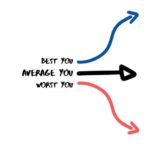How would you define these words?
- “Leadership”
- “Respect”
- “Fairness”
- “Honesty”
Odds are high that each and every one of you would describe them rather differently.
For example, if you were to ask random people on the street how they might define the quality of leadership, you might get a whole host of answers. Some may focus on how they communicate, others would highlight their strong actions that inspire people, and some would fixate on their skill in organizational tasks.
What is interesting is that if you then follow up with the question, “Are you above average in leadership ability?”, you would find that nearly 70% of people would report that they are. Somehow that math is not quite adding up.
Time and time again studies have explored this phenomenon and demonstrated the human tendency to overestimate ourselves and underestimate others. Whether it’s our generosity in donations, contributions towards household chores, or rating of our own work – our tendency is to see ourselves as above average and others and somewhat less than.
Simply put, we are quick to look in the rose-coloured mirror.
This inclination to see the world in such a self-righteous way is so insidious, that even when we are educated on it, we still ignore it. However, it is this kind of “naïve realism” that is often what holds people back from seeing the bigger picture. We all have an urge to believe that we see the world directly as it truly is. We further believe that we have all the facts and therefore everyone should agree with us.
Evidently, we conclude that anyone who does not agree with us, must either not know all the facts or is being misguided by their interests and ideologies. We become so wrapped up in looking at and judging how other people’s circumstances have shaped them into who they are that we forget how much we have been shaped by our own past. We become unaware of our own biases.
Here’s the reality though, this naïve realism does serve a purpose. It has the ability to keep our self-esteem high and ensures that we do not live a world full of constant self-doubt. We can’t go around thinking that we are always inadequate because then we will never develop our self-efficacy.
The thing I am really trying to address is how sometimes it can be helpful to look at our situation from a truly objective viewpoint. What I am worried about is that if we always think we are above average, we will never see the areas that we can actually improve.
It is easy to compare and judge others for their faults. It takes no effort to see tiny flaws in a teammate, coach, or friend. But ask yourself this: When you criticize others, what flaw are you seeing in them that you actually do not like seeing in yourself?
Nobody wants to see themselves as imperfect. It is much more enjoyable to find a comfortable place along the mountainside and judge those moving all around us. But is that getting you any closer to the top?
-Derek





